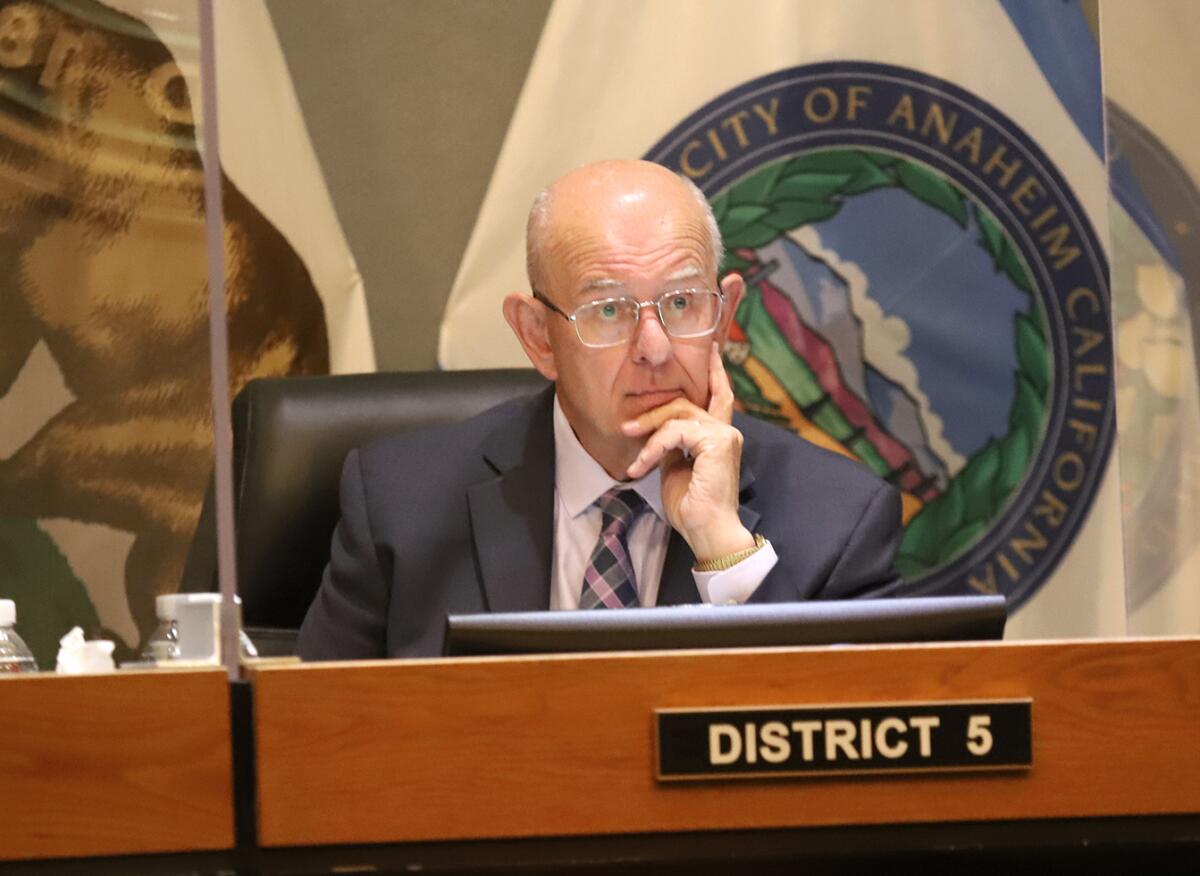Anaheim postpones voting on law limiting gifts from lobbyists

- Share via
An effort to cap gifts from lobbyists to Anaheim city officials failed to move forward with no scheduled date on when the proposed law could come back for consideration.
The Anaheim City Council debated the reform, which would set a $50 gift-giving limit on lobbyists and others doing business with the city, during its Nov. 13 meeting.
Council members Carlos Leon and Jose Diaz worked together to champion the law, which is the latest reform effort in the wake of an FBI political corruption probe that surfaced two years ago. The investigation rooted out cannabis corruption, halted the Angel Stadium deal and led to the conviction of former Anaheim Mayor Harry Sidhu.
“We’re reinforcing our commitment to ethical governance and we’re providing transparency that our community deserves,” Leon said at the meeting. “By setting a high standard for our conduct, we’re showing our commitment to a transparent government where decisions are made openly without any hidden agenda or personal gain.”
If passed as proposed, the law would ban gifts worth more than $50 given by registered lobbyists, current or prospective contractors and people seeking licenses, permits or entitlements from the city. The bans would be in effect for a calendar year before and after they seek to do business with the city.
Outside of those “restricted sources,” city officials could still receive and report gifts up to the state limit of $590 per year.
Artin Berjikly spoke before the Sept. 24 Anaheim City Council meeting and pledged to fulfill the duties of his position, which was created in the aftermath of political corruption scandals.
“The goal of this ordinance, again, is not to seek any sort of punishment against an official or a gift giver,” said Artin Berjikly, Anaheim’s new ethics officer. “It is to seek compliance and the ability to correct.”
The proposed law allows for a 30-day cure period where a city official can return, reimburse or donate a gift exceeding $50 to charity. If a city official knowingly violates the law, penalties could include censure, admonishment and termination of employment.
Councilman Stephen Faessel raised some initial concerns and sought to boost the gift cap to $100.
“The $50 limit is, candidly, very tight,” he said while phoning into the meeting. “It’s going to be difficult for some of us to manage.”
Faessel noted that council members are often invited to receptions and that such a strict gift cap might put them in the position of counting shrimp on a dinner plate so as to not violate the law.
Berjikly framed $50 as a median point between total gift bans and $100 thresholds enacted by other local governments.
Currently, state law requires council members to report gifts over $50 on their statement of economic interests forms filed every year.
A review by TimesOC of forms filed by current council members shows a number of dinners reported as gifts. Disneyland has also given gifts to several council members, including tickets to the theme park in 2022 on the same day of its star-studded Christmastime candlelight procession.
Diaz is the only council member to report no gifts.
An Angels consultant planned a rehearsal for City Hall leaders before a council meeting to approve the sale of Angel Stadium, court records show.
Councilwoman Natalie Rubalcava supported the reform but wanted clarification that the practice of council members soliciting donations to nonprofits — known as behested payments — could be considered gifts.
Berjikly, who serves in the city attorney’s office, said that such activities wouldn’t be covered by the law, which satisfied Rubalcava’s concerns.
Citing Anaheim’s recent Halloween parade, Councilwoman Norma Campos Kurtz asked Berjikly if a fee waiver granted to council members to participate in it would run afoul.
“We’re allowed to have a car with our name on it and drive and waive to the folks,” she said. “Anybody else that wants an entry into the parade pays a fee. Would that be considered a gift?”
Berjikly opined that such activities would probably fall under ceremonial exemptions.
The questions and confusion prompted Faessel to ask for a vote on continuing discussion on the proposed law at some later date, which drew a rebuke from Leon.
“We had previously considered doing an all-out gift ban from everybody,” he said. “Had we done that, then those concerns that my colleagues have mentioned … maybe there’d be some concern there.”
Approving a first reading of the law at the Nov. 13 meeting would have allowed council members to pass it with a second procedural vote at its scheduled Nov. 19 meeting.
But the gift cap lacked immediate support.
Council members voted 4-3, with Mayor Ashleigh Aitken being the swing vote, to postpone discussion on the law indefinitely.
“We don’t need to get it fast,” Aitken said. “We need to get it right.”
Faessel and Diaz term out next month with two new council members set to be seated.
All the latest on Orange County from Orange County.
Get our free TimesOC newsletter.
You may occasionally receive promotional content from the Daily Pilot.






